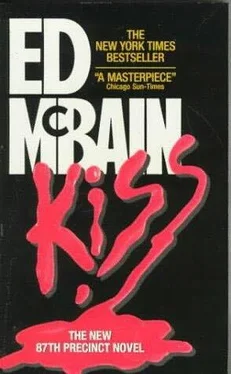The people, the places are all fictitious.
Only the police routine is based on established investigatory technique.
She was standing at the center of the subway platform, waiting for the uptown train to come in, when the man stepped up to her and punched her.
She felt shocking pain and then immediate outrage, how dare he? And then she remembered that this was the city in which she'd been born and bred, and in this city crazy things happened, and when they happened you tried to protect yourself. So she stepped back and away from him-a glimpse of red, he was wearing a red woolen hat-and was swinging her handbag at his head when he shoved her toward the edge of the platform.
He's crazy, she thought, he's a lunatic, and she said out loud, "Stop it, are you crazy?”
but he grabbed her arm and pulled her toward the very edge of the platform, trying to throw her over, struggling with her. She screamed, she pulled away, tried to pull away, heard her coat tearing up the back when he reached for her again.
Each time she moved away from the edge of the platform, he shoved her back again. The red hat, a brown jacket, blue jeans-she saw all these in almost subliminal flashes. He was only an inch or so taller than she was, but he was much stronger, and when finally he put all his strength into what seemed a last, desperate shove, she lost her balance and fell backward onto the tracks. In the moment before she went over, she saw his boots. Brown leather boots with a white- A train was coming.
She heard its thunder up the track, and from where she was crouched on her knees she turned to see its lights in the distance. She scrambled to her feet, tried to get back onto the platform, it was almost waist high, put her hands flat onto it, and tried to hoist herself up as if she were in a swimming pool and bouncing up out of the water. But there was no water here, there was no buoyancy to help her, there was only the high platform and the rattling sound of the train coming closer. Help me, she said to no one, Oh dear God, help me, and grabbed the edge of the platform with both hands, the train rumbling closer, thrusting herself up from the elbows, swinging one leg over the rim, scrabbling for purchase, the other leg over and up now, she was on the platform now, the train not thirty feet away and screeching out of the darkness.
Her pantyhose were laddered, her coat split up the back seam. She was wearing only a light wool dress under the coat. Shivering from the cold, or her fear, or perhaps both, her eye throbbing where the man had punched her, both hands bruised from trying to cushion her fall to the tracks, knees scraped raw and bleeding, she lay flat on the platform, hugging the platform, sobbing, sucking in great gobs of air.
She did not know how long it was before a Transit Authority policeman came to her.
Five feet eight inches tall, blonde and buxom and blue-eyed and bursting with red-cheeked health, Birgitta Rundqvist marched into the station house at three o'clock on the afternoon of December 28, the Friday before the big New Year's Eve weekend. It was eight degrees Fahrenheit outside, but she was wearing only a lightweight red parka over a red reindeer-patterned sweater, a short black mini, red pantyhose, and little cuffed black boots. The desk sergeant thought she looked like Little Red Riding Hood. Birgitta told him she wanted to talk to a detective. When he asked her why, she said she had just witnessed a murder attempt.
This was a rarity. Someone in this city actually coming to the police to report having witnessed a crime.
The desk sergeant figured if you lived long enough, you saw everything. He buzzed the squadroom.
Upstairs, Detective Meyer Meyer was sitting at his desk, minding his own business, typing up a report. Across the room, Andy Parker and Fat Ollie Weeks were talking about the new police commissioner. Parker and Weeks got along fine together. That's because they were both bigots. Weeks was perhaps a bigger bigot than Parker, but nobody can be only a little bit pregnant, although Weeks did in fact look a little bit pregnant-in fact about three months gone.
Obese and a trifle smelly, his belly hanging over his belt buckle, his fat, round face set with little pig eyes, Weeks was here visiting his good old buddies at the Eight-Seven, his own bailiwick being the Eight-Three, all the way uptown in Diamondback. Parker was always happy to see him. In Weeks's presence, and by comparison, Parker seemed nattily dressed-even though he was sporting a three-day beard stubble and a wrinkled suit. Whenever anyone questioned Parker's appearance, he told them he was on a stakeout. Whenever anyone questioned Weeks's appearance, he told them to go fuck themselves. Parker liked him a lot.
"The new commissioner's a scholar," Weeks said.
"A professor," Parker said, nodding in agreement.
"Used to teach criminology down there in that shitty little town the mayor snatched him from.”
"He always refers to himself as we, you notice that? We this, we that. We feel the number of policemen on the street has nothing to do with crime prevention ...”
"We have learned over the years that community interaction is paramount. ...”
"We this, we that.”
"Like he's two people," Weeks said, and turned suddenly to look at Meyer. "You listening to this?”
he asked.
"No," Meyer said.
"You ought to," Weeks said. "You might learn a few things about this new commissioner we got.”
"I know enough about the new commissioner," Meyer said.
"Without your people," Weeks said, "there wouldn't be this new commissioner.”
The new police commissioner was black.
So was the new mayor.
Weeks was saying that if it hadn't been for the Jews in this city, a black mayor wouldn't have been elected, and if a black mayor hadn't been elected, there wouldn't now be a black police commissioner. Meyer himself hadn't voted for the new mayor, but neither the new mayor nor the new commissioner was on anyone's Top Ten list at the moment, and it was always easy to blame the failings of one minority group on yet another minority group. Crouched behind his typewriter, pecking out his report with the index fingers of both hands, blue eyes squinting at the page in the roller, bald head gleaming in the late afternoon light that streamed through the grilled windows, Meyer wanted nothing less than an argument about either the new commissioner or the new mayor. He busied himself with indifference.
"Maybe the new commissioner can show your people where Bethtown is," Weeks said, and nudged Parker with his elbow.
Bethtown was the city's smallest sector, across the River Harb and reached either by ferry or bridge. Weeks was making a joke. The new commissioner had been quoted in yesterday's papers as asking his driver where Calm's Point, one of the city's largest sectors, was located. Meyer agreed that the man was a small-town hick in bib overalls, so why was Weeks virtually insisting that Meyer defend him? He was about to tell Weeks to stuff the new commissioner up his ass when the telephone rang.
"Eighty-Seventh Squad," he said, "Detective Meyer." He listened for a moment, raised his eyebrows in surprise, said, "Send her up," and then put the receiver back on the cradle. Birgitta came into the squadroom some three minutes later. Weeks looked her up and down. So did Parker. Meyer offered her the chair alongside his desk.
She told him who she was, told him she worked as a nanny for a Mrs. David Feinstein on Barber Street in Smoke Rise ...
"I'm from Stockholm," she said.
Which was why she was dressed for the tropics, Meyer supposed.
... told him she was just wheeling the baby into the house when she saw this automobile come roaring around the corner ...
Читать дальше












